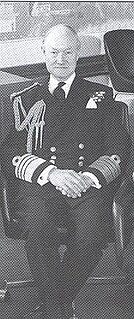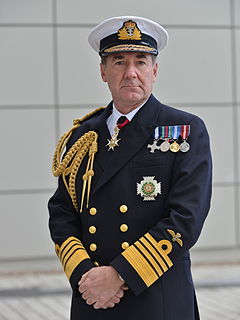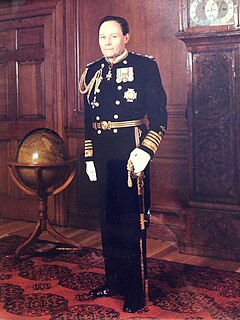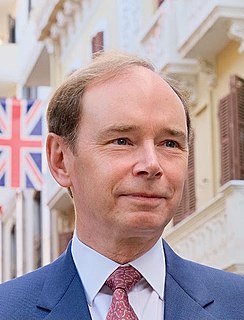
The Second Sea Lord and Deputy Chief of Naval Staff is deputy to the First Sea Lord and the second highest-ranking officer to currently serve in the Royal Navy and is responsible for personnel and naval shore establishments. Originally titled Second Naval Lord in 1830, the post was restyled Second Sea Lord in 1904. They are based at Navy Command, Headquarters.

Admiral of the Fleet Michael Cecil Boyce, Baron Boyce, is a retired senior Royal Navy officer who now sits as a crossbench member of the House of Lords.

Admiral of the Fleet Peter John Hill-Norton, Baron Hill-Norton, was a senior Royal Navy officer. He fought in the Second World War as gunnery officer in a cruiser operating on the Western Approaches and in the North Sea taking part in the Norwegian Campaign, then in a cruiser taking part in the Arctic convoys and finally in a battleship operating in the Eastern Fleet. After the War he commanded a destroyer and then an aircraft carrier. He served as First Sea Lord and Chief of the Naval Staff and then Chief of the Defence Staff in early 1970s. In the latter role he gave the final commitment to Project Chevaline, the Polaris missile improvement programme. He went on to be Chairman of the NATO Military Committee.

Admiral Sir John Cunningham Kirkwood "Jock" Slater, is a retired Royal Navy officer. He commanded a minesweeper, a frigate and then a destroyer before taking over the aircraft carrier HMS Illustrious and then achieving higher command in the Navy. He served as First Sea Lord and Chief of the Naval Staff from 1995 to 1998: in that capacity he played a key role in the 1998 Strategic Defence Review carried out by the Labour Government that had come to power a year earlier.

Admiral Sir Nigel Richard Essenhigh is a former Royal Navy officer who served as First Sea Lord and Chief of the Naval Staff from 2001 to 2002. He served as a navigating officer before commanding the Type 42 destroyer HMS Nottingham and then the Type 42 destroyer HMS Exeter during the Gulf War. As First Sea Lord he entered into a contract to acquire up to 150 Joint Strike Fighter aircraft for the UK's two new aircraft carriers. In retirement he worked for Northrop Grumman and became a non-executive director of Babcock International. He remains a Deputy Lieutenant of Devon.

Admiral of the Fleet John David Elliott Fieldhouse, Baron Fieldhouse, was a Royal Navy officer. He commanded five submarines and a frigate before achieving higher command from the 1970s. Following the invasion of the Falkland Islands by Argentine forces in April 1982, Fieldhouse was appointed Commander of the Task Force given responsibility for "Operation Corporate", the mission to recover the Falkland Islands. The campaign ended in the surrender of Argentine forces in June 1982. He became First Sea Lord and Chief of Naval Staff in December that year and, in that role, persuaded the British Government to fund the replacement of ships lost in the Falklands War. He went on to be Chief of the Defence Staff from 1985 until his retirement in 1988.

Admiral of the Fleet Sir Henry Conyers Leach, was a Royal Navy officer who, as First Sea Lord and Chief of the Naval Staff during the early 1980s, was instrumental in convincing the British prime minister, Margaret Thatcher, that retaking the Falkland Islands from Argentina was feasible. On account of the determination he showed in the matter, journalist and political commentator Andrew Marr described him as Thatcher's "knight in shining gold braid".

Admiral of the Fleet Sir John Julian Robertson Oswald was a senior Royal Navy officer. After training as a gunnery specialist, Oswald commanded a frigate and then a destroyer before achieving higher command in the navy. He served as First Sea Lord and Chief of Naval Staff in the early 1990s. In that capacity he advised the British Government on the reduction in the size of the fleet under the Options for Change restructuring programme and on the deployment of Naval Support for the Gulf War in 1991: he also made the decision that members of the Women's Royal Naval Service should be allowed to serve in Royal Navy ships.
Captain Sir Nicholas Peter Wright, KCVO was Private Secretary to The Princess Royal from 2002 to 2019. On his retirement from the post he was appointed an Extra Equerry to Her Royal Highness from 1 February 2019.

Admiral Sir Mark Stanhope, is a retired Royal Navy officer. After serving as a submarine commander, he commanded a frigate and then commanded an aircraft carrier on operational patrol off Sierra Leone. He went on to be Deputy Supreme Allied Commander Transformation and then Commander-in-Chief Fleet. He served as First Sea Lord and Chief of the Naval staff, the professional head of the Royal Navy, from July 2009 to April 2013. In this role he advised the British Government on the deployment of naval forces during operations around Libya. He was succeeded by Admiral Sir George Zambellas in April 2013.

Admiral Sir George Michael Zambellas, is a retired Royal Navy officer. He was the First Sea Lord and Chief of the Naval Staff from April 2013 until he handed over duties to Admiral Sir Philip Jones in April 2016.
The Australian Defence Organisation (ADO) is composed of the armed forces of the Commonwealth of Australia, the Australian Defence Force (ADF), and the Australian Public Service government department, the Department of Defence which is composed of a range of civilian support organisations.
Rear Admiral Sir David Allen, was a senior Royal Navy officer who served as Defence Services Secretary from 1988 to 1991.

Navy Command is the current headquarters body of the Royal Navy, and as of 2012 its major organisational grouping. It is a hybrid, neither a command, nor simply an installation. Royal Navy official writings describe Navy Command Headquarters both as a physical site, on Whale Island, a collective formed of the most senior RN officers, and as a budgetary grouping.
Admiral Sir Michael Henry Gordon Layard, is a retired senior Royal Navy officer who served as Second Sea Lord from 1992 to 1995.

Admiral Sir Brian Thomas Brown, was a senior Royal Navy officer who served as Second Sea Lord and Chief of Naval Personnel from 1988 to 1991.
Admiral Sir Desmond Parry Dreyer, was a senior Royal Navy officer who served as Second Sea Lord and Chief of Naval Personnel from 1965 to 1967.

Vice Admiral Sir David George Steel, is a retired senior Royal Navy officer who served as Second Sea Lord between 2012 and 2015. He assumed the office of Governor of Gibraltar on 11 June 2020.

Admiral Sir Philip Andrew Jones, is a retired senior Royal Navy officer. After service in the South Atlantic in 1982 during the Falklands War, he commanded the frigates HMS Beaver and HMS Coventry. He went on to be Flag Officer, Scotland, Northern England and Northern Ireland, Commander United Kingdom Maritime Forces and Assistant Chief of the Naval Staff before being appointed Fleet Commander and Deputy Chief of the Naval Staff. Jones served as First Sea Lord from April 2016 to June 2019.












